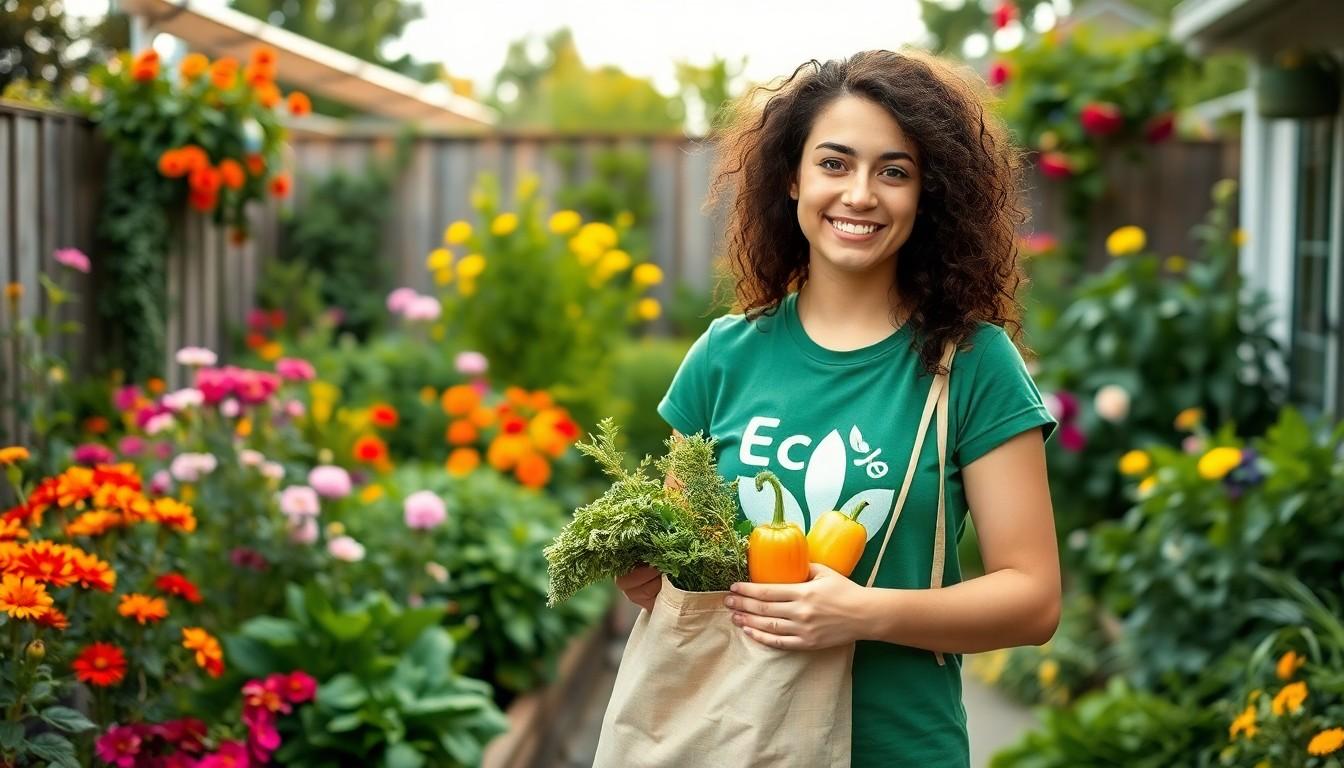Table of Contents
ToggleIn a world where plastic seems to multiply faster than rabbits, embracing sustainable living isn’t just a trend—it’s a necessity. Picture this: a lifestyle that not only saves the planet but also makes you feel like a superhero every time you refuse a plastic straw. Sustainable living isn’t about sacrificing comfort; it’s about making smarter choices that benefit both you and Mother Earth.
Understanding Sustainable Living
Sustainable living focuses on minimizing one’s environmental impact while promoting a healthier lifestyle. Making informed choices helps create a balance between personal well-being and ecological preservation.
Definition of Sustainable Living
Sustainable living involves adopting practices that support ecological balance, ensuring resources meet current needs without compromising future generations. It encompasses decisions around food, energy, transportation, and waste management. Individuals engaging in sustainable living often prioritize renewable resources, reduce waste, and support local economies. Adopting minimalistic lifestyles further reinforces sustainability by reducing consumerism and encouraging resource conservation.
Importance of Sustainability
Sustainability holds immense significance for preserving the planet’s health. It addresses critical issues like climate change, biodiversity loss, and resource depletion. Embracing sustainable living not only mitigates environmental damage but also enhances quality of life. Healthier ecosystems lead to cleaner air, water, and improved food systems. Furthermore, sustainability promotes social equity by fostering communities that prioritize inclusivity and well-being. Overall, prioritizing sustainability creates a more resilient future for all.
Key Principles of Sustainable Living

Sustainable living encompasses various critical practices aimed at reducing environmental impact. Focusing on specific actions helps individuals contribute positively to the planet.
Reduce, Reuse, Recycle
Reducing waste plays a vital role in sustainability. Individuals can minimize their consumption of single-use items such as plastic bags and disposable containers. Reusing items extends their lifecycle, allowing for reduced demand for new products. Think of using glass jars for storage or repurposing old furniture. Recycling transforms materials like paper, glass, and metal into new products, diverting waste from landfills. Following local recycling guidelines ensures effective processing. Together, these practices create a significant positive impact on the environment.
Sustainable Energy Choices
Choosing renewable energy sources greatly reduces carbon footprints. Solar power, wind energy, and hydroelectricity provide sustainable alternatives to fossil fuels. Individuals can install solar panels or opt for green energy through utility companies. Energy-efficient appliances also contribute significantly by utilizing less power while delivering similar performance. Switching to LED lighting minimizes energy consumption in homes. These conscious choices create a cleaner energy future and promote sustainability.
Water Conservation Strategies
Conserving water protects vital resources and supports sustainability efforts. Simple actions, like fixing leaks and using low-flow fixtures, minimize water waste. Collecting rainwater for irrigation promotes eco-friendly gardening practices. Limiting shower times and turning off faucets while brushing teeth can significantly reduce water usage. Additionally, choosing drought-resistant plants encourages responsible landscaping. Implementing these strategies fosters responsible water management, benefiting both the environment and personal households.
Sustainable Home Practices
Sustainable home practices create a positive impact on the environment and promote healthier living spaces. Incorporating eco-friendly options leads to more energy-efficient households.
Eco-Friendly Home Improvements
Selecting sustainable materials enhances home efficiency and reduces environmental impact. Bamboo flooring and recycled glass countertops offer durable and attractive choices. Installing energy-efficient appliances cuts energy consumption significantly. Opting for LED lighting lowers electricity bills while minimizing waste. Implementing smart home technology allows for better energy management and convenience. Incorporating natural insulation materials improves thermal performance and comfort.
Sustainable Gardening Techniques
Sustainable gardening practices support ecosystem health and enhance food security. Using native plants conserves water and requires less maintenance. Implementing composting systems recycles kitchen scraps, enriching the soil naturally. Employing crop rotation minimizes pests and maintains soil fertility. Utilizing rainwater harvesting systems saves water and nourishes gardens efficiently. Organic pest control options protect plants without harmful chemicals.
Sustainable Eating Habits
Sustainable eating habits play a vital role in reducing environmental impact. Making mindful choices about food can significantly contribute to a healthier planet.
Choosing Local and Organic Foods
Opting for local and organic foods supports sustainable agriculture and reduces carbon emissions associated with transportation. Purchasing from local farmers’ markets helps strengthen regional economies while ensuring fresh, seasonal produce. Organic foods often use environmentally friendly farming practices, minimizing pesticide usage and promoting soil health. Consumers can also enjoy better flavor and nutritional value when selecting ingredients grown close to home. By prioritizing local and organic items, individuals contribute to a more sustainable food system.
Reducing Food Waste
Minimizing food waste is essential for sustainable living and can dramatically lower overall environmental impact. Planning meals ahead can prevent over-purchasing and encourage smarter shopping choices. Utilizing leftovers creatively fosters a culture of resourcefulness. Composting scraps provides nutrients for soil and keeps food waste out of landfills. When individuals prioritize reducing food waste, they contribute to sustainability efforts while saving money and resources. Simple actions, like proper portioning and timely consumption, can make a significant difference in the fight against waste.
Getting Involved in Your Community
Engaging in the community strengthens local sustainability efforts and fosters meaningful connections. Active participation in local initiatives can lead to significant environmental improvements.
Supporting Local Businesses
Supporting local businesses directly impacts sustainable living. Choosing to shop at farmer’s markets not only boosts the local economy but also reduces transportation emissions. Opting for goods produced within the community often means fresher, healthier options. Many local businesses prioritize eco-friendly practices, contributing positively to the environment. Strengthening these connections encourages a robust local economy that values sustainability. Also, participating in local workshops fosters skills in sustainable practices while creating a sense of belonging.
Participating in Environmental Activism
Participating in environmental activism influences positive change on a larger scale. Joining local clean-up events helps beautify neighborhoods while promoting community pride. Engaging with organizations focused on sustainability raises awareness about pressing environmental issues. Attending town hall meetings allows individuals to voice concerns and advocate for eco-friendly policies. Collaborating with like-minded individuals amplifies efforts to address climate change and promote environmental justice. Making informed choices can inspire others and create a ripple effect in the community.
Sustainable living is more than a choice; it’s a commitment to a healthier planet and a better quality of life. By embracing eco-friendly practices and making informed decisions, individuals can significantly reduce their environmental footprint. Each small action contributes to a larger movement towards sustainability, promoting a balance between personal well-being and ecological health.
Engaging with local communities and supporting sustainable initiatives further amplifies these efforts. As more people adopt these practices, the collective impact can lead to meaningful change. The journey towards sustainability is ongoing, but every step taken is a stride towards a resilient future for generations to come.







